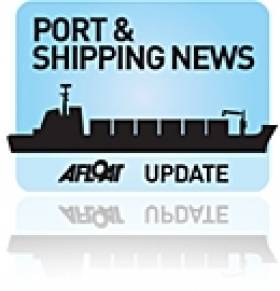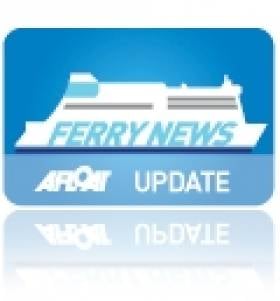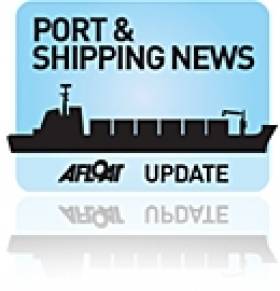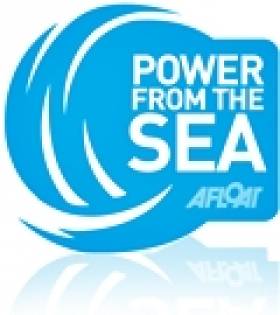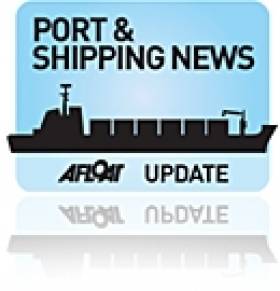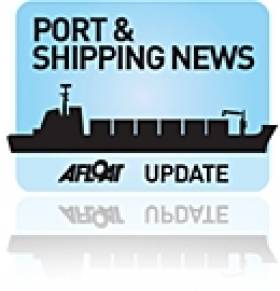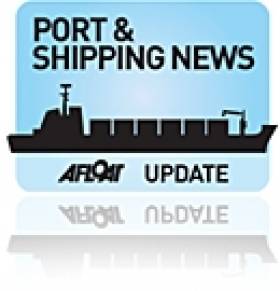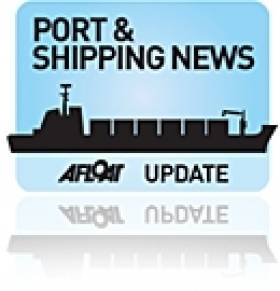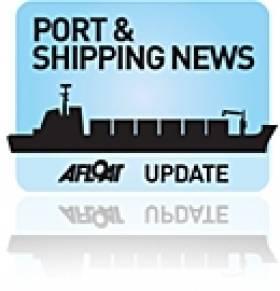Displaying items by tag: Irish Maritime Development Office
Mairéad Ní Cheóinín Appointed to Seafarers UK Fundraising Role
Mairéad Ní Cheóinín has been appointed to Seafarers UK as the charity’s new Corporate Fundraising Manager where her focus will be on engaging with the commercial maritime sector.
Mairéad brings a wealth of business development, marketing experience and industry knowledge to the position from her previous roles, working with Steamship Mutual P&I, TradeWinds, Informa PLC in London and the Irish Maritime Development Office in Dublin.
Mairéad joins the grant-giving, campaigning and fundraising charity at an exciting time, as it celebrates its Centenary and is looking ahead to the next phase of its future. Her role will be to raise awareness of Seafarers UK’s wider impact within the maritime charity sector.
Seafarers UK aims to increase financial support for its charitable work through encouraging participation in corporate donations, employee fundraising, challenge events and payroll giving, as well as funding support for specific projects.
Last year Seafarers UK awarded £2.57 million in funding to 69 organisations and projects, helping more than 185,000 people in the process. For more information about Seafarers UK’s work or any of its fundraising or donation initiatives please visit www.seafarers.uk
Commenting on her appointment Mairéad Ní Cheóinín said ‘I am honoured to join Seafarers UK at this juncture. It is vitally important to maintain awareness within the maritime and fishing sectors of the contribution Seafarers UK has made and continues to protect and provide for the welfare of past, present and future seafarers. I am looking forward to promoting all the great work and initiatives Seafarers UK supports to our existing and new corporate partners and donors.’
Nigel Shattock, Seafarers UK’s Director of Fundraising & Communications, said ‘I am very pleased to be able to announce Mairéad’s appointment. The Seafarers UK team is looking forward to working with Mairéad in her role of reaching out to the wider maritime sector and asking firms and their staff to get to know our unique charity better, and to work with us in achieving our goals of helping seafarers in need, supporting maritime youth and in raising awareness of the opportunities that this fantastic sector has to offer.’
Paris To Host Shortsea 13 Convention
#Shipping - The European Shortsea Conference will take place for the first time in France on Thursday 14 March 2013.
Shortsea 13 at La Defense in Paris is organised by the Bureau de Promotion du Shortsea Shipping (BP2S) and SPC France jointly with other European Shortsea promotion centres - and comes just weeks after the Euromaritime exposition that kicks of tomorrow in the French capital.
The conference will cover a number of hot topics related to shorts and intermodal intra-european transport, the challenges that exist and are yet to come, and what solutions can be found.
And like last year's event, hosted in Dublin by the Irish Maritime Development Office (IMDO) and Coastlink, the convention will provide a platform to network, discuss and debate issues shared by European shipping partners.
Organisers say that contributors are still welcome to take part as speakers (e-mail [email protected] for more) or sponsors (contact [email protected] for details).
Registrations will open soon for those wishing to attend as delegates. Keep an eye on the Shortsea 13 blog or find more information on the European Shortsea Network at www.shortsea.info.
Irish Ferries Win Best Ferry Company
#FERRY NEWS- Irish Ferries has won the 'Best Ferry Company' award at the Irish Travel Agents Association travel industry awards held last night in the Mansion House, Dublin.
This was the thirteenth time that the award has gone to Irish Ferries since the event started two decades ago. The award which was presented on foot of votes cast by travel agents and their staff employed throughout the island of Ireland was accepted jointly by its head of passenger sales Declan Mescall and passenger sales manager Marie McCarthy.
Thanking travel agents for the honour their decision bestows on the company, Mr. Mescall said that the Best Ferry award reflects the high standard of service which passengers can now expect from Irish Ferries.
'In addition, it recognises the numerous developments that have taken place in the company in recent times, including the introduction of class leading advances in electronic communications, the most recent being the introduction of the industry's first bookable smart phone app which was launched just months ago' said Mr. Mescall.
The award follows Irish Ferries parent company Irish Continental Group (ICG) whose Dutch based container division Eucon Shipping and Transport was awarded Short Sea Shipping Company of the Year Award 2011, sponsored by the Irish Maritime Development Office (IMDO).
Eucon operate regular feeder services to Antwerp, Rotterdam and Southampton from the ports of Belfast, Dublin and Cork.
Port & Shipping Volumes Continue Slowdown in 3rd Quarter
#PORTS & SHIPPING- The volume of shipping and port traffic through the Republic of Ireland continued to decline during the third quarter of 2011, according to the latest analysis of traffic figures released by the Irish Maritime Development Office (IMDO).
Results from third quarter data indicate that only 1 of the 5 principal freight segments had any growth over the third quarter, while all other segments declined compared to the same period last year as outlined below in the key third quarter data:-
• Lift-on/Lift-off (lo/lo) trades were down 5%
• Roll-on/Roll-off export traffic was down by 2%
• Dry bulk volumes increased by 2%
• Break bulk volumes were down by 3%
• The Tanker/Liquid bulk market was down 7%.
For a more in-depth analysis of each freight-transport mode issued by the IMDO and accompanied by graphic charts click HERE. In addition to compare the 3rd quarter figures with the previous 2nd quater for this year click HERE.
Ireland Risks Missing Out On Renewable Energy Benefits
Ireland must do more to develop its port and shipping services or risk missing out on the benefits of the growning renewable energy sector.
That was the message from a new analysis compiled by the Sustainable Energy Authority of Ireland and the Irish Maritime Development Office, as reported by Renewable Energy Magazine.
The current lack of supply services and equipment for renewables in Irish ports could threaten the country's promise in the fields of offshore wind, tidal and wave energy, the report states.
It is estimated that the total value of such renewable energy sectors could be as much as €16 billion.
The east coast has been identified as the best location for offshore wind and tidal projects, while the south and west coasts were best for wave power and wind farms.
“We now need to look at the investment in infrastructure required if we are to properly capitalise on the current opportunities in this area," said the report.
Renewable Energy Magazine has more on the story HERE.
Port and Shipping Volumes Show Second Quarter Slowdown
Below is a list of figures for each transport mode based for the second quarter of 2011.
•Lift-on/Lift-off (lo/lo) trades remained static at 0%.
•Roll-on/Roll-off (ro/ro) export traffic was down by 1%.
•Dry bulk volumes increased by 5%,
•Break bulk volumes were down by 6%
•The Tanker/Liquid bulk market was down 6%.
For more in-depth analysis of each freight-transport mode issued by the IMDO and accompanied by graphic charts click HERE.
Shipping Volumes Up in First Quarter
First quarterly figures for 2011 show that volumes of shipping and port traffic on the majority of principal sectors grew, according to the Irish Maritime Development Office (IMDO).
The figures below outline a moderate trade volume growth in four out of the five key freight segments: Lift-on/ lift-off (lo-lo), Roll-on/Roll-off (ro-ro),dry-bulk, break-bulk and the tanker/liquid market.
• Total lift-on/ lift-off (lo/lo) trades volumes grew by 3%.
• Roll-on/Roll-off export traffic was also up 2% per cent on an all island basis.
• Dry bulk volumes through ROI ports increased by 21%,
• Breakbulk volumes were also up 25%
• The tanker/liquid market was the only sector to record a decline, down by -12% compared to the same period last year.
For further information about the figures, charts and a summary released from the IMDO click here
Speaking at the ceremony Mr. Murphy commented: "d'Amico Group are one of a leading number of firms that are driving investment in this sector in Ireland which is contributing to new employment and growth opportunities".
Entry of the new dry-bulkers marks another important chapter in the d'Amico Group's development since it established its Irish office in 2002, as the vessels are managed from its Dublin office under the Irish Tonnage Tax (ITT) regime.
Four more newbuilds are under construction in Korea, scheduled for delivery in 2012, and two under construction in Japan which are due in 2013. The latter ships represent a further investment in excess of US $310 million to the Italian company that began and grew as a family business in 1936.
To read more about this logon to the IMDO website and also www.damicoship.com
The act is designed to assist in securing the future of the Irish shipping sector in which five new companies in 2010 entered the scheme, generating an increase of 44% in the number of vessels (from 154 to 177) covered by the Tonnage Tax. Half of these vessels range less than five years old with the total average age at eight years.
In addition the initiative has directly created 314 jobs in 2009 to nearly 350 jobs last year. Most of the employment is in specialised areas such finance,technical management, operations and chartering.
Commenting on the data, IMDO Director Glenn Murphy said "The results are a positive indication that after long periods of decline for the industry that policy support measures have encouraged investment which has led to growth and new employment. We are optimistic that direct employment
in the high value professional shipping services sector could double over the next five years leading to further investment and job creation opportunities"
The majority of Irish-based ship-owning firms operating within the ITT scheme are not entirely reliant on the Irish economy for their daily core revenue streams but are instead employed in the international shipping markets.
In 2010 the global shipping business had total charter trading transactions estimated at $450 billion dollars. It was a year in which the shipping markets continued to be quite volatile with most sectors still recovering from large charter earnings declines over the previous 12 months. Overall Irish firms were quite resilient in their ability to compete last year.
The growth in this sector in Ireland has been driven by established Irish-owned companies Arklow Shipping Ltd (ASL) and the Mainport Group and inward investment has come from D'Amico and Ardmore Shipping. The chemical and products tanker fleet operator located its headquarters to Cork last year and the company is backed by a large US private equity firm.
To read more from the report, you can request a copy by contacting the IMDO by e-mailing [email protected]
The McCarthy Report on Seaport Recommendations
The McCarthy Report: Recommendations on Seaports and Port Industry Structure reviews statistical and port data analysis based from the Irish Maritime Development Office (IMDO) financial analysis of the ports sector in 2010.
To read in greater detail the main conclusions and recommendations click here.
Check the latest ports and shipping news



























